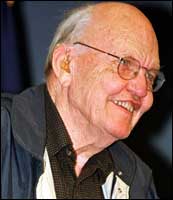 Nobel laureate Jack Kilby, whose 1958 invention of the integrated circuit ushered in the modern electronics age and made possible the microprocessor, has died after a battle with cancer.
Nobel laureate Jack Kilby, whose 1958 invention of the integrated circuit ushered in the modern electronics age and made possible the microprocessor, has died after a battle with cancer.
Kilby died Monday at age 81 at his Dallas home, said Texas Instruments Inc., where he worked for many years.
Before the integrated circuit, electronic devices relied on bulky and fragile circuitry, including glass vacuum tubes. Afterward, electronics could become increasingly more complex, reliable and efficient: powering everything from the iPod to the Internet.
During his first year at Texas Instruments, using borrowed equipment, Kilby built the first integrated circuit into a single piece of semiconducting material half the size of a paper clip. Four years later in 1962, Texas Instruments won its first major integrated circuit contract, for the Minuteman missile.
Kilby later co-invented the hand-held electronic calculator.
"TI was the only company that agreed to let me work on electronic component miniaturization more or less full time, and it turned out to be a great fit," Kilby wrote in an autobiography for the Nobel Committee in 2000, the year he won the prize for physics.
Today, integrated circuits are everywhere, from microwave ovens to Mars landers.
The contributions of Kilby -- who also co-invented the handheld calculator -- are hard to overstate, technology experts say.
His 2000 Nobel citation said Kilby "laid the foundation of modern information technology."
"In my opinion, there are only a handful of people whose works have truly transformed the world and the way we live in it -- Henry Ford, Thomas Edison, the Wright Brothers and Jack Kilby," TI chairman Tom Engibous said in a statement Tuesday. "If there was ever a seminal invention that transformed not only our industry but our world, it was Jack's invention of the first integrated circuit."
Kilby's more than 60 US patents included one filed in 1959 for an integrated circuit made of the element germanium.
"It was kind of a string-and-chewing-gum gadget that just showed you could use semiconductors to make all the bits and pieces. But it was far from something that you could do on a practical basis," said Gordon Moore, who co-founded Intel Corp. in 1968 with Robert Noyce.
In 1961, Noyce received a patent for a similar but more complex integrated circuit made of silicon while at Fairchild Semiconductor.
"Kilby may have built the first one," Moore said. "Noyce's approach was how to do it on a practical basis. They really complemented one another."
Moore, who got to know Kilby well over the years, said he admired Kilby's creativity, inventiveness and modesty.
"He was always coming up with creative ideas. I remember way back before people considered it important, he was inventing a gadget that used silicon to turn solar energy into hydrogen. It was kind of ahead of the problems we are looking at now," Moore said.
After winning the Nobel, Kilby said of his invention, "I thought it would be important for electronics as we knew it then, but I didn't understand how much it would permit the field to expand."
In 1970, in a White House ceremony, he received the National Medal of Science. In 1982, he was inducted into the National Inventors Hall of Fame.
Kilby spent his later years as a consultant to TI, working on industry and government assignments throughout the world. A few years ago, Dallas-based TI named a $154 million research and development complex in his honor.
Known by colleagues as a humble man of few words, the 6-foot-6 Kilby said he never craved fame or wealth.
"I think it just happened," Kilby said in a 2000 interview with The Associated Press. "It wasn't deliberate. I didn't say, 'Inventors are nice and I want to be one.' I just think if you work on interesting projects, invention is kind of a natural consequence."
Jack St. Clair Kilby was born in 1923 in Great Bend, Kan. His father was the owner of a small electric company, and Kilby became interested in radio tubes while listening to big band radio in the 1940s.
He earned degrees in electrical engineering from the universities of Illinois and Wisconsin, and began his career in 1947 with the Centralab Division of Globe Union Inc. in Milwaukee, developing ceramic-based, silk-screened circuits for electronic products.
Kilby is survived by two daughters, five granddaughters, and a son-in-law.
AP technology writer Matthew Fordahl in San Jose, Calif., contributed to this report.





 © 2025
© 2025